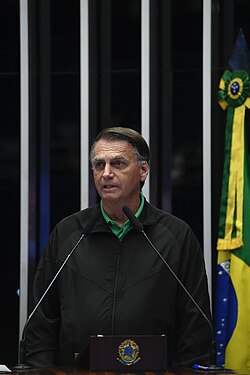Monday, September 15, 2025

Image: Carlos Moura.
The ruling was announced on Thursday. Brazil‘s Supreme Federal Court, formed by a panel of five justices, sentenced former president Jair Bolsonaro to 27 years and three months in prison, on five charges related to an alleged plot to overturn the result of the 2022 election.
Four out of the five justices voted to convict Bolsonaro on all charges, which include heading an armed criminal organisation, attempting to plot a coup and abolish the democratic rule of law through violent means, as well as two charges regarding the damage of property during the storming of government buildings by Bolsonaro’s supporters in Brasília on 8 January 2023. While announcing Bolsonaro’s sentence on Thursday night, Justice Alexandre de Moraes said the former president had attempted to destroy “the essential pillars of the democratic rule-of-law state”, the consequences of which would have been the return of dictatorial rule in the country, The Guardian reported. Justice Cármen Lúcia likewise labelled it an effort to “sow the malignant seed of anti-democracy”, but highlighted the continuing resilience of the democratic institutions.
According to prosecutors, part of the alleged plan involved assassinating then president-elect Luiz Inácio Lula da Silva, his Vice President Geraldo Alckmin, and Supreme Court Justice Alexandre de Moraes, through the use of explosives, poison or weapons of war. Justice Luiz Fux said there was “absolutely no proof” Bolsonaro was aware of or involved in such a plan.
In sharp disagreement with their colleagues, Justice Luiz Fux voted to acquit Bolsonaro on all charges on September 10, arguing there was no evidence he was aware of the supposed plot or had attempted to orchestrate a coup, and that the court lacked jurisdiction over the case.
Seven Bolsonaro co-conspirators were also convicted, namely former defence ministers Walter Braga Netto and Paulo Sérgio Nogueira de Oliveira, former aide-de-camp Mauro Cid, retired general Augusto Heleno, former justice minister Anderson Torres, former naval commander Almir Garnier Santos, and former police officer Alexandre Ramagem, Al-Jazeera reported.
Bolsonaro and the seven other defendants denied any of the allegations. Bolsonaro’s lawyers expressed their intention to appeal his conviction and sentence before the full Supreme Court, which is currently composed of eleven justices, according to AP. The AP also quoted law professor Rafael Mafei, who said it was “unlikely, but not impossible” that an appeal would reach the full court.
Bolsonaro, who is under house arrest in Brazil’s capital, is not expected to face prison until all legal avenues are exhausted.
Following the ruling, thousands of Brazilians, including members of the LGBTQ+ and Indigenous communities, gathered in the streets of Brasília, Rio de Janeiro and other cities to celebrate Bolsonaro’s conviction, as reported by The Guardian. President of Chile Gabriel Boric and President of Colombia Gustavo Petro both welcomed the ruling and highlighted it as a symbolic victory for democracy.
US President Donald Trump, who had earlier imposed 50% export tariffs on Brazilian goods because of the case, said the court’s decision was “very surprising”, though he didn’t confirm whether he would seek new sanctions on Brazil, when inquired by CNN reporters on Thursday. In a post on social media, Secretary of State Marco Rubio called the case a “witch hunt” and said the Trump administration would respond accordingly.
In a The New York Times essay published on Sunday, President Lula da Silva defended the court’s decision as a “historic decision which safeguards our institutions and the democratic rule of law”, and dismissed accusations by the US government of a “witch hunt”. He also claimed that the Trump administration was weaponising its tariff policies and the Magnitsky Act to grant Bolsonaro impunity. Lula concluded his essay by telling President Trump that Brazil remained open to negotiating “anything that can bring mutual benefits”, but warned that “Brazil’s democracy and sovereignty are not on the table”.
Sources
[edit]
- Vanessa Buschschlüter. Brazil’s Lula hits back at Trump over Bolsonaro trial and tariffs — BBC News Online, September 15, 2025
- Tom Phillips. Brazilians take to the streets to celebrate Bolsonaro conviction — The Guardian, September 12, 2025
- Gabriela Sá Pessoa, Mauricio Savarese. Brazilian Supreme Court panel sentences Bolsonaro to more than 27 years in prison for coup attempt — Associated Press, September 11, 2025
- Tom Phillips. Bolsonaro sentenced to 27 years for plotting military coup in Brazil — The Guardian, September 11, 2025
- Julia Vargas Jones, Michael Rios. Brazil’s former President Jair Bolsonaro convicted of plotting coup, sentenced to over 27 years in prison — CNN, September 11, 2025
- Brazil Supreme Court sentences Bolsonaro to 27 years over coup plot — Al Jazeera, September 11, 2025
- Vanessa Buschschlüter, Ione Wells. Brazil’s former President Bolsonaro found guilty of coup plot — BBC News Online, September 11, 2025

.svg/250px-Brazil_(orthographic_projection).svg.png)






